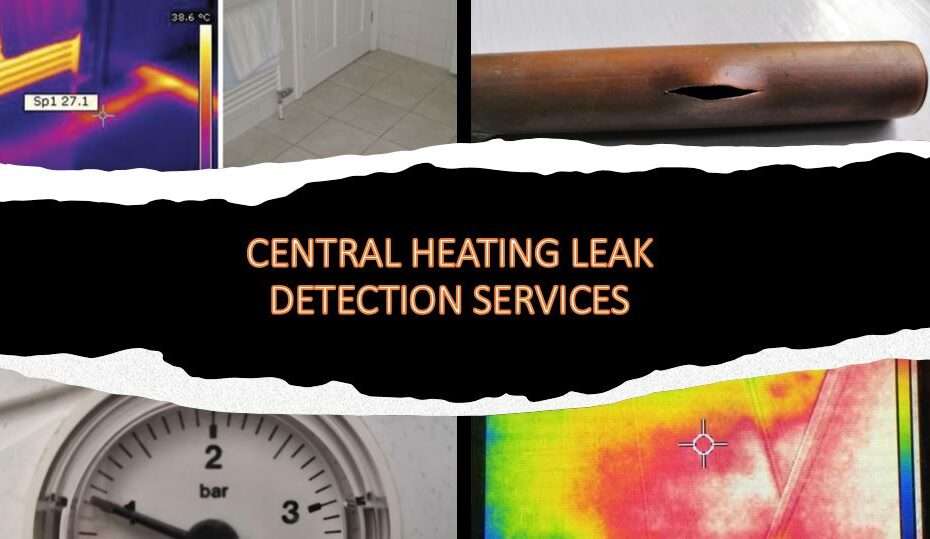The demand for central heating leak detection increases in the colder winter months. As people start to use their boiler more, they can often spot issues with central heating leaks, including from pipework, radiators, connections etc.
In this guide, we will discuss this further, to help you understand what could potentially be causing your central heating plumbing leak, and additionally why central heating leak detection could be beneficial for you.
Table of Contents
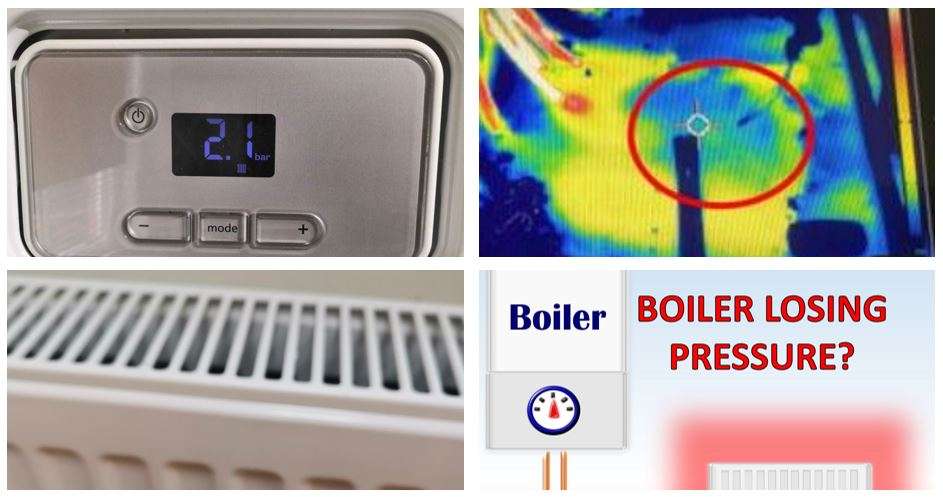
We’ll not be specifically covering boiler leaks as that has been explained in more detail elsewhere in detailed guides such as:
- F1 Boiler Fault Code – Explained
- Boiler Pressure Low? – Leak Calculator
- Combi Boiler Leaking? – Guide
Here, we will be covering how and where you may be experiencing a central heating leak on the distribution network of pipes and radiators around your home or business. This can then lead to your boiler pressure dropping and even stopping it working eventually.
Causes of Central Heating Leaks
Before understanding the central heating leak detection process, let’s look at some of the top causes of central heating leaks. Here are 5 of the most common causes:
- Wear and tear / age of your central heating system
- Linked to that, corrosion of copper pipes
- Damage, including accidental damage, to pipes
- Issues with high pressure causing leaks
- Finally, frozen pipe leaks when ice forms
There are clearly more than these five causes of central heating leaks in homes and that will depend on the type of pipework and radiators you have, where the pipes are located and the design, size, layout and construction of your property.
Related to that – see our guide to when you have a radiator leaking.
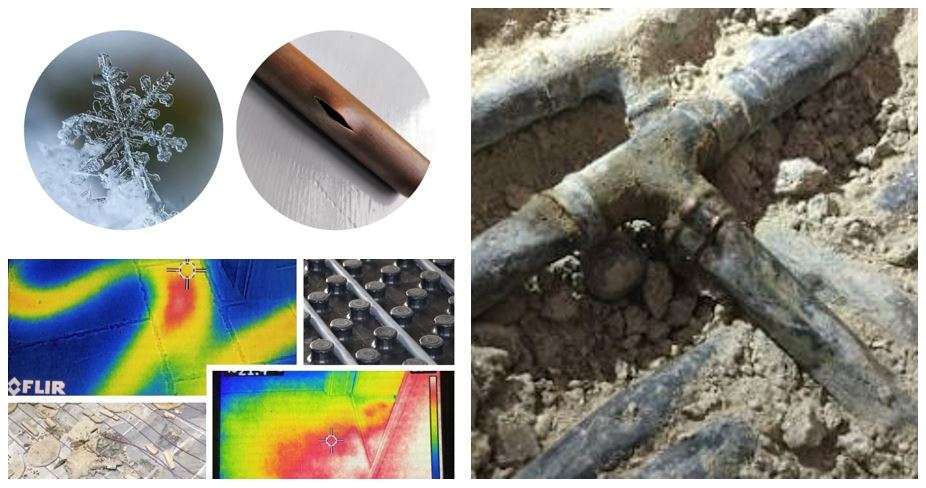
Signs of Central Heating Leaks
With central heating leaks, there are a number of things that you can be vigilant for to help spot them early. If you spot any of these things, it could be time to contact central heating leak detection experts like us:
- Noticing your boiler pressure dropping (quickly or slowly)
- Linked to that, boiler error messages or warnings
- Signs of water damage, staining or wet patches in your home
- Perhaps combined with that, signs of mould damage
- Unusual smells or odours (central heating water often smells)
- In some instances the sound of running water in your home
- Radiators or towel rails not heating up properly
- Especially if air is trapped in them (requiring them to be bled)
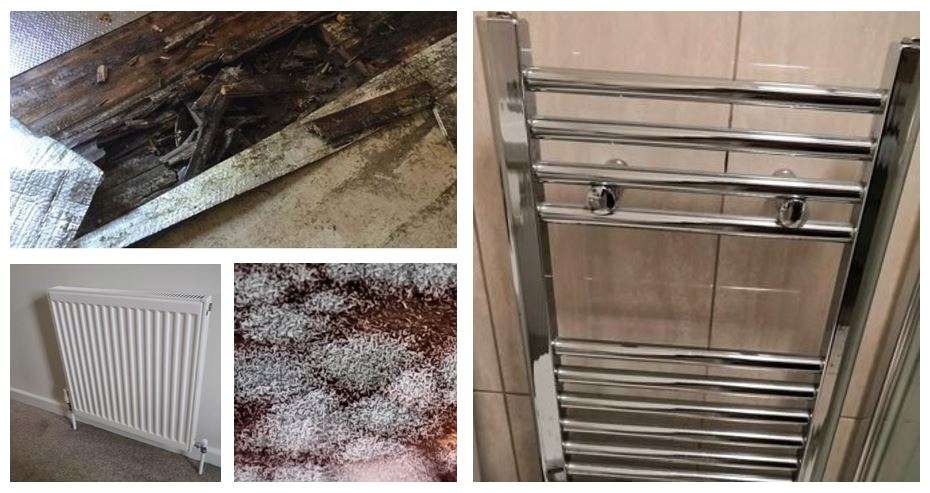
As we have covered previously, seeing more than one of the things listed above can be an increased likelihood that you have a leak and would benefit from central heating leak detection. This is a professional specialist service and likely to be far more effective than DIY leak detection. There is a lot of benefit to early leak detection.
Acting Early on Central Heating Leaks
Following on from the previous section, a great piece of advice with regard to central heating leaks is to act early if you suspect you have a leak. Being prompt can save you money in the long term especially when you factor in the potential water damage restoration work that can be required if left too long.
Remember that central heating pipes are commonly hidden in floors, walls and ceilings so the damage can be happening in locations you cannot immediately see with the human eye. Catching a central heating leak early can help prevent this water damage.
We discuss water damage and the associated risks in our article about Ceiling Water Damage, and related to that when you have a Shower Leaking Through Ceiling
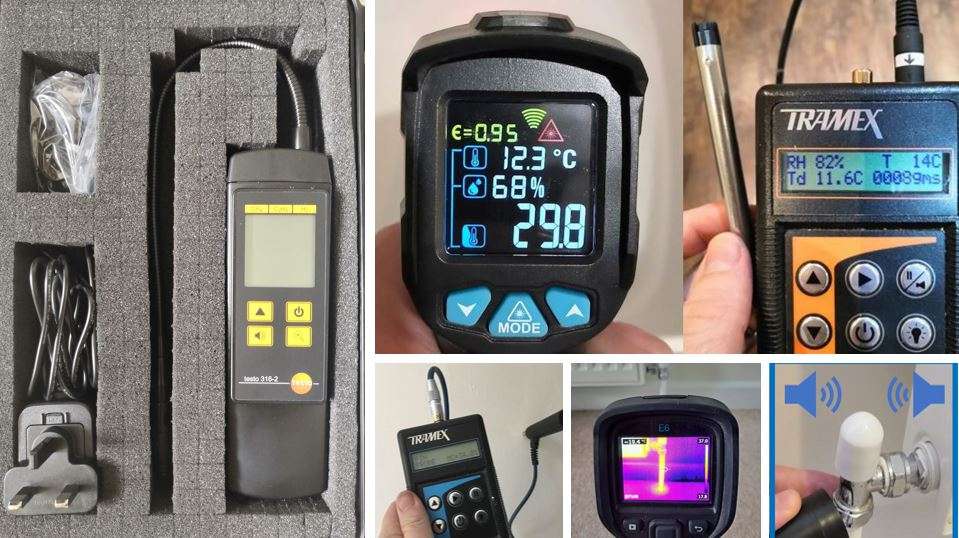
Central Heating Leak Detection Methods
We tailor, refine and adjust our central heating leak detection methods on a number of factors, and one is the type of leak. Finding a central heating leak is different to finding a cold water feed in an underground water leak for example, which may require slab leak detection.
Here are some of the best methods to find central heating leaks:
- Thermal Imaging Leak Detection Cameras
- Acoustic Leak Detection
- Tracer Gas Leak Detection
- Moisture Meter Leak Detection
- Pipe Detectors for Leaks
We discuss many of these further in the articles linked above and our guide to Advanced Leak Detection Systems which is very informative too.
It is worth noting though that water leak detectors alone do not guarantee you will find a leak. These devices are very specialised and best utilised in the hands of leak detection experts like us. Our staff have a lot of experience, systems and tools to help maximise the chances of locating water leaks. All these things work together, including on central heating leaks.
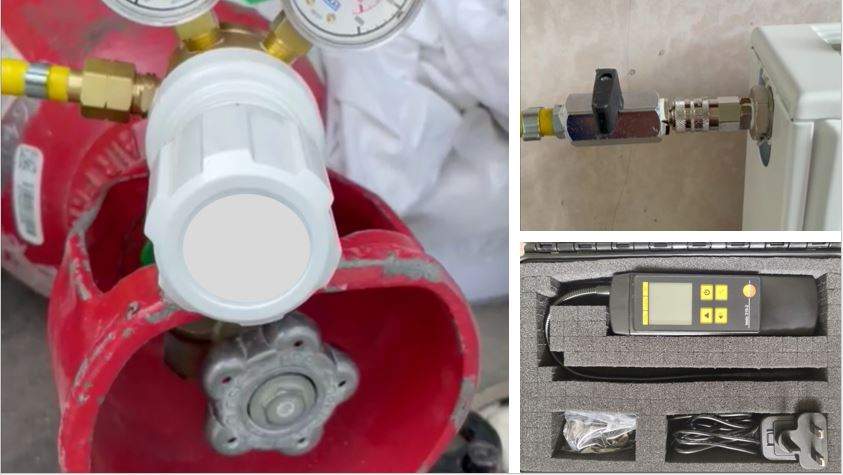
Preventing Central Heating Leaks
Central heating leaks can occur unexpectedly and suddenly in your home or business and there is no way of guaranteeing that it does not affect you. However, there are a few things that are worth considering when it comes to helping to prevent central heating leaks.
Here are some things which could be beneficial:
- Regular checks and maintenance of your boiler and central heating system
- Using high quality materials and installers with high standards
- On that, making sure you work with a Gas Safe Registered engineer
- Coupled with these, keeping on top of using advised levels of inhibitor etc.
- Being vigilant around your heating network, especially when not used for a while
- Being very careful around pipework when doing maintenance or construction
- Keeping an eye on your boiler pressure and warning / fault messages
Some of these things do have a cost but it could save you money in the long run, especially if this effort helps to stop a future central heating leak. There is also the inconvenience of potentially having no central heating in cold weather!
We have an accompanying article to this which goes into more detail on central heating leak detection services in the UK. We think you will find it useful and informative.
Please remember that, if you have a central heating leak in your home and additionally you have Trace and Access on your home insurance cover, the cost of finding and fixing the water leak could be paid for by your insurer. It’s worth checking to see if you have it.
We hope you’ve found our guide to central heating leaks useful. Hopefully you also understand the benefits of central heating leak detection services. We genuinely hope you won’t have a water leak in your home but, if you do, contact us for help from our team of water leak detection experts.
Here are some other similar articles you might find interesting too:
- E119 Boiler Fault Code
- Vaillant F22 Boiler Fault
- Vaillant F75 Boiler Fault
- Loft Tank Leaks
- Water Leak From An Upstairs Flat
Central Heating Leak Detection FAQs:
How do I find a leak in the central heating system?

Finding exactly where a leak is in a central heating system can be challenging and is often best carried out by experts. Central heating pipes are often hidden in walls, floors and ceilings or even underground. The specialist equipment that leak detection companies such as ourselves have, coupled with experience and expertise, can help locate tricky leaks.
Why is the heating system leaking?

If your central heating system is leaking across the network of pipes, there can be a number of causes of this happening. This can vary from simple wear and tear / corrosion or could have happened from damage to the pipes, joints or radiators attached to them. Locating such leaks can be challenging and specialist leak detection methods are used by experts.
How do you find a heating leak under my floor?

Depending on construction, layout, design and materials used in your central heating network of pipes that distribute hot water to your radiators, the best method to locate the leak may vary. For example, finding a leak in a central heating pipe under concrete could be very different to pinpointing a leak under floorboards, therefore exact methods may vary.
